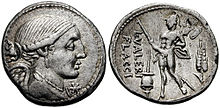
The gens Valeria was a patrician family at ancient Rome, prominent from the very beginning of the Republic to the latest period of the Empire. Publius Valerius Poplicola was one of the consuls in 509 BC, the year that saw the overthrow of the Tarquins, and the members of his family were among the most celebrated statesmen and generals at the beginning of the Republic. Over the next ten centuries, few gentes produced as many distinguished men, and at every period the name of Valerius was constantly to be found in the lists of annual magistrates, and held in the highest honour. Several of the emperors claimed descent from the Valerii, whose name they bore as part of their official nomenclature.[1]
A number of unusual privileges attached to this family, including the right to burial within the city walls,[2][3] and a special place for its members in the Circus Maximus, where the unique honour of a throne was granted them.[4] The house built by Poplicola at the foot of the Velian Hill was the only one whose doors were permitted to open into the street.[5][6] The historian Barthold Georg Niebuhr conjectured that, during the transition from the monarchy to the Republic, the Valerii were entitled to exercise royal power on behalf of the Titienses, one of the three Romulean tribes that made up the Roman people.[7]
Although one of the most noble and illustrious families of the Roman aristocracy, from the very beginning the Valerii were notable for their advocacy of plebeian causes, and many important laws protecting the rights of the plebeians were sponsored by the Valerii.[8] As with many other ancient patrician houses, the family also acquired plebeian branches, which must have been descended either from freedmen of the Valerii, or from members of the family who, for one reason or another, had gone over to the plebeians.[1]
- ^ a b Dictionary of Greek and Roman Biography and Mythology, vol. III, pp. 1215, 1216 ("Valeria Gens").
- ^ Cicero, De Legibus ii. 23.
- ^ Plutarch, "The Life of Publicola", 23.
- ^ Livy, ii. 31.
- ^ Dionysius, v. 39.
- ^ Plutarch, "The Life of Publicola", 20.
- ^ Niebuhr, History of Rome, vol. i. p. 538.
- ^ Dictionary of Antiquities, s. v. Leges Valeriae.